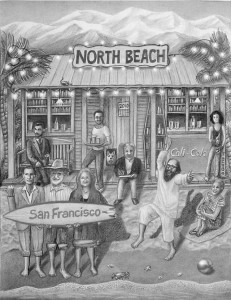 Editor Jay Rubin announced in Alehouse Number 4 that this will be the final print issue of the magazine: “While recessions may be good for poets, providing material for future poems, such economic downturns are detrimental for publishers. As a result, we’ve had to scale back our menu a bit, trimming out our usual list of essays. Next year, rather than risk the high waves of continued economic uncertainty, we plan to shutter our doors against impending storms. Regrettably, we will not publish a hard-copy issue in 2011. Instead, we’ll post an on-line version while maintaining our annual Happy Hour Poetry Awards.”
Editor Jay Rubin announced in Alehouse Number 4 that this will be the final print issue of the magazine: “While recessions may be good for poets, providing material for future poems, such economic downturns are detrimental for publishers. As a result, we’ve had to scale back our menu a bit, trimming out our usual list of essays. Next year, rather than risk the high waves of continued economic uncertainty, we plan to shutter our doors against impending storms. Regrettably, we will not publish a hard-copy issue in 2011. Instead, we’ll post an on-line version while maintaining our annual Happy Hour Poetry Awards.”
NewPages Blog
At the NewPages Blog readers and writers can catch up with their favorite literary and alternative magazines, independent and university presses, creative writing programs, and writing and literary events. Find new books, new issue announcements, contest winners, and so much more!
Save the Words
From the folks at Oxford Fajar via Oxford University Press: Save the Words, where you can “adopt” unused, unloved, and unwanted words such words as veprecose, obarmate, and buccellation – along with hundreds more. You can also sign up for a word-a-day and find helpful suggestions on how to help spread the word. All for free.
Spread the word!
Audio :: PoemTalk
Newly released: The 35th episode of the PoemTalk series. This is a 25-minute audio podcast program, a discussion of Bruce Andrews’s “Center” from Moebius. The PoemTalkers this time are Tan Lin, Sarah Dowling, and Chris Funkhouser.
PoemTalk is a co-production of the Center for Programs in Contemporary Writing, the Kelly Writers House, and the Poetry Foundation.
Next time PoemTalk will be on the road, in Chicago, talking with three Chicagoans about Jennifer Scappettone’s rewriting of H.D.
Spread the word!
Poebe Writing Contest Winners
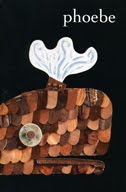 Phoebe, Fall 2010, features the winner of the Phoebe Winter Fiction Contest (Andrew Bynom), and the winner Greg Grummer Poetry Award (Aran Donovan) as well as honorable mention (Jendi Reiter).
Phoebe, Fall 2010, features the winner of the Phoebe Winter Fiction Contest (Andrew Bynom), and the winner Greg Grummer Poetry Award (Aran Donovan) as well as honorable mention (Jendi Reiter).
Spread the word!
Is Pay-Per-Review a True Review?
Victoria Strauss at Writer Beware Blog takes on Pay-Per-Review resources, with a clear focus on PW’s new ‘feature’: PW Select: Opportunity of Exploitation?
Spread the word!
Borderlands and The Translingual Aesthetic
Borderlands Texas Poetry Review (Number 34; Spring/Summer 2010) features a special section on translations from and into Spanish, from French, German, and Zapotec into English as well as works from authors who are “bilingual or, even translingual…and who write in two or more languages, and often self-translate. All these dual writers have a very unique aesthetic that lets them refine their dual creations, as they playfully go back and forth.” Editor Liliana Valenzuela goes on to discuss the joy and difficulty experienced by such work created by translingual writers as well as recognizing the work of several translators.
Spread the word!
Pongo Writing Resources for Troubled Teens
As Pongo Teen Writing Project launches their 16th year of helping youth to express difficult feelings through poetry, they also continue to offer a wealth of resources for those working with young writers, especially in similar populations as Pongo’s focus – teens who are in jail, on the streets, or in other ways leading difficult lives.
Pongo provides writing activities and other resources for teachers, counselors, and advocates working with teens.
The Pongo Project Journal is a regularly updated blog of youth writing and advocate experiences. Here are some of the most recent posts:
Approaching the Trauma, Not the Crime (by Alex Russell, about his Pongo experience in juvenile detention)
Love Is a Useless Puppy (Pongo Prize poetry, about a young woman’s love for a boy who treats her badly)
Cops (about police officers who came to understand their own unprocessed trauma from violence and death)
Thea (about a young widow who uses writing to deal with grief and isolation, and to describe a transcendent joy)
Thanks for the Rose (about a gift from the women at Mission Creek Corrections Center, at our emotional finale)
Shaun (about the ways one volunteer’s religious beliefs inform his work with Pongo)
Good for You! (about Pongo teens and caring)
Loss, Love, and Ambivalence (about Pongo authors’ role as our teachers on deep matters)
A Prize Poem (first winner of the Pongo Poetry Prize, about a young woman’s deep need for love)
Relationships (about a writing activity for the women at Mission Creek Corrections Center)
Spread the word!
Conversation :: Jeffrey Jullich and Litmus Press
Litmus Press has started a YouTube Channel which features Jeffrey Jullich, reading from and discussing his new book Portrait of Colon Dash Parenthesis with Paul Foster Johnson.
Spread the word!
Black Lawrence Press Chapbook Competition Winner – 2010
Amelia Martens has been announced as the winner of the Spring, 2010 Black River Chapbook Competition with her manuscript Purgatory. The short list and long list for the competition have been posted on the Black Lawrence Press blog.
Spread the word!
All the Whiskey in Heaven
In some fundamental ways, and at this far-flung point along the literary timeline, it's hard to believe that this is the first Charles Bernstein collection issued by a mainstream press. After all, here is a poet and essayist who has been publishing steadily for thirty-five years, yet not only that, an academic of some renown whose reputation has only become greater over those almost-four decades. What perhaps makes sense of this delay in making Bernstein's poetry available to a potentially wider audience is his foundational role within the L=A=N=G=U=A=G=E school and his guilt-by-association with that movement's so-called “difficulty.” In fact, what All the Whiskey in Heaven makes abundantly clear is that Bernstein, anyway, is an immensely readable poet whose writing is varied, investigational, and quite often robustly hilarious. Continue reading “All the Whiskey in Heaven”
Spread the word!
Bar Napkin Sonnets
It’s odd to start a collection of poems by politely turning down a pick up line, but Moira Egan just comes right out with it in the opening of the first of two dozen sonnets: “A glass of wine, a napkin, and a pen / are all I need.” But something – the cadence or the spitfire wit of the delivery, or maybe the way I imagine the speaker looking up and coyly drawing a strand of hair behind her ear as she flatly rejects her suitor – the way I, like a bully’s toady, am drawn to rejection – causes me to push past her declination and further into a formal introduction of the chapbook: Continue reading “Bar Napkin Sonnets”
Spread the word!
Shahid Reads His Own Palm
Deconstruction of identity is a recurring motif in African-American literature. The exploration of the physical, emotional and spiritual devastation wrought by slavery continues to haunt its characters be it in literature, poetry or music. The most dangerous of slavery’s effects is its negative impact on the individual’s sense of self. Alienation underpins much of Black American writing. Slaves were told they were subhuman and were traded as commodities, whose worth could be expressed only in dollars. Consequently the much criticized “one theme” of African-American writing (slavery) cannot be escaped. In Toni Morrison’s Beloved, for example, Paul D – a typical exponent – describes his heart as a “tin tobacco box.” After his traumatizing experiences at Sweet Home and, especially, at the prison camp in Alfred, Georgia, he locks away his feelings and memories in this “box,” which has, by the time Paul D arrives at 124, “rusted” over completely. By alienating himself from his emotions, Paul D hopes to preserve himself from further psychological damage. In order to secure this protection, however, Paul D sacrifices much of his humanity by foregoing feeling and gives up much of his selfhood by repressing his memories. Although Paul D is convinced that nothing can pry the lid of his box open, his strange, dreamlike sexual encounter with Beloved – perhaps a symbol of an encounter with his past – causes the box to burst and his heart once again to glow red. Continue reading “Shahid Reads His Own Palm”
Spread the word!
The Best Of (What’s Left Of) Heaven
Thursday, January 01, 2004
Dammit more champagne. Continue reading “The Best Of (What’s Left Of) Heaven”
Spread the word!
Writers in Exile: Washington Square
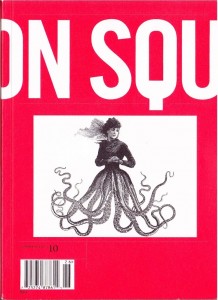 Washington Square‘s “Borderlands Issue” (Summer/Fall 2010) features writing that, rather than being interspersed throughout the issue, is given a devoted section of the magazine. According to Editor Martin Rock, though it may seem strange that the work is “cordoned” off, the “decision comes from our desire to give voice to writers in exile, be it self-imposed or otherwise, and to provide them with a space, both metaphorical and literal, to put up their feet and stay a while.” Those guests (with most works appearing in translation)include Meena Alexander, Jean-Luc Raharimanana, Drajica Rajcic, Avrom Sutzkever, Aung Way, Patrice Nganang, Soheil Najm, Huan Xiang, Idris Bazorkin, and an interview with Austin Woerner.
Washington Square‘s “Borderlands Issue” (Summer/Fall 2010) features writing that, rather than being interspersed throughout the issue, is given a devoted section of the magazine. According to Editor Martin Rock, though it may seem strange that the work is “cordoned” off, the “decision comes from our desire to give voice to writers in exile, be it self-imposed or otherwise, and to provide them with a space, both metaphorical and literal, to put up their feet and stay a while.” Those guests (with most works appearing in translation)include Meena Alexander, Jean-Luc Raharimanana, Drajica Rajcic, Avrom Sutzkever, Aung Way, Patrice Nganang, Soheil Najm, Huan Xiang, Idris Bazorkin, and an interview with Austin Woerner.
Spread the word!
Lesbian & Bi Poets
From Jezebel online: Ten Lesbian & Bisexual Poets To Fall in Love With – complete with sidebar links to each and some great additional materials posted in the comments section.
Spread the word!
Diane di Prima Spotlight in Paterson Literary Review
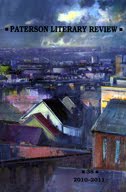 In addition to an editorial introduction to the author’s work, the 2010-2011 annual issue of Paterson Literary Review (38) features a forty-page spotlight on the poetry (and one short story) of Diane di Prima. According to editors, this spotlight will be followed up in PLR 39 with a selection of essay on di Prima’s work.
In addition to an editorial introduction to the author’s work, the 2010-2011 annual issue of Paterson Literary Review (38) features a forty-page spotlight on the poetry (and one short story) of Diane di Prima. According to editors, this spotlight will be followed up in PLR 39 with a selection of essay on di Prima’s work.
Spread the word!
Narrative Spring Contest Winners
 Winners of the Narrative Magazine Spring Story Contest:
Winners of the Narrative Magazine Spring Story Contest:
FIRST PRIZE
Scott Tucker I Would Be Happy to Leave This Asylum
SECOND PRIZE
Peter Grimes Victoria
THIRD PRIZE
Megan Mayhew Bergman Birds of a Lesser Paradise
FINALISTS
Elizabeth Benedict Death of a Deadbeat Dad
Mary Costello The Sewing Room
Marta Evans Intruder
Katherine Jaeger Ambition, Distraction, Uglification, Derision
Eli Lindert Tacos in Chicago
Alexander Maksik A Tobogganist
Jerry Mathes II Still Life
E. V. Slate The Ferry
Lynn Stegner The Anarchic Hand
Lori Tobias Going to the City
Upcoming Contests:
The Fall 2010 Story Contest, with $6,500 in prizes. Open to fiction and nonfiction. All entries will be considered for publication. Deadline: November 30, 2010.
The 30 Below Story Contest 2010, with $3,250 in prizes. All entries will be considered for publication. Open to all submissions from writers and artists age thirty and below. The contest runs from September 15 through October 29, 2010.
Spread the word!
Gospel Earth
Jeffery Beam’s celebration of the “small poem” in his latest collection, Gospel Earth, diverts his reader from ambient noise, trims the excess from the natural world. His poems stand out because they whisper, infusing Gospel Earth with stillness and secrecy. Beam creates a quiet book in form and tone, filling the page with white space that emphasizes the solitude and fragility of his images. His aim is to observe the “wide silences that do not ache to be filled,” and he invites the reader to collude with his minimalist vision. His poems emerge like Continue reading “Gospel Earth”
Spread the word!
Hold Tight
From the Morton Salt Girl to straight bois, the fever dream of Jeni Olin’s second full collection of poetry, Hold Tight: The Truck Darling Poems draws the reader into the solitary world of the personal: the private space where the ruminations and raw anxieties that dominate the human mind cavort. In this manner Olin explores identity and connection with an astute, pain-allied beauty in four sections of short poems. Continue reading “Hold Tight”
Spread the word!
The Return
If you’re reading this review, on this website, you probably know who Roberto Bolaño is/was. You know he died at age 50, likely due to complications from drug and alcohol addictions. You know he was a poet who switched to fiction to support his family. You’ve probably read at least one of his two major works, The Savage Detectives and 2666, and probably a couple of the shorter works like Amulet, Antwerp or Last Evenings on Earth. Continue reading “The Return”
Spread the word!
Kids of the Black Hole
As a member of Generation X, I’ve often wondered what happened culturally in the mid-to-late 70s. Our society went from peaceful, late-60s hippies to the mass-market and watered-down kitsch of the 80s. Dewar MacLeod’s new book can explain it all. Continue reading “Kids of the Black Hole”
Spread the word!
Diasporas in the New Media Age
Once upon a time, I could really get into this kind of writing. The title intrigued me. The topic was captivating. The whole idea of merging the concepts of new media and diaspora was fascinating. And then, I read the book. While the compilation spans a great breadth of “diaspora,” and as such is an inclusive and interesting mix of authors and definitions, the mix also falls flat as the connections between the various communities and medias the contributors talk about are hard to hold on to. For example, looking at the Digital Diaspora of India as seen in the growing emergence of Bollywood caricatures and Indian-ness in Second Life (“3D Indian (Digital) Diasporas” by Radhika Gajjala), juxtaposed with the use of social networking and Orkut in the outlanders of Brazil (“Tidelike Diasporas in Brazil: From Slavery to Orkut” by Javier Bustamante). The overarching understanding tacit in most of the contributors’ writing was that societal bonds, while already tenuous in splintered or diasporic communities, may be further impacted by the use and creation of “virtual” communities that reify or overblow particular essences of the original community (especially in “Maintaining Transnational Identity: A Content Analysis of Web Pages Constructed by Second-Generation Caribbeans” by Dwaine Plaza). Continue reading “Diasporas in the New Media Age”
Spread the word!
Brazil
My copy of Jesse Lee Kercheval’s Brazil smells like Froot Loops, and I don’t mind one bit. The candy-fruit aroma only enhances the sensory snack that this novella serves. More than a snack, really, Kercheval’s short novel delivers dinner and a movie in the same timeframe in which most novels are just passing the hors d’oeuvres. Continue reading “Brazil”
Spread the word!
High Notes
Winner of the Samuel T. Coleridge Prize, Lois Roma-Deeley’s latest poetry collection High Notes tours the bleak, unforgiving world of jazz in the late 1950s with a cast of five dramatis personae who move through impoverished landscapes of bars, pawnshops, grimy hotels and police stations. Carrying burdens of regret and despair, death and rage, the figures who people High Notes pacify themselves with liquor and dope in the loneliest corners of Chicago, New York, Detroit, Kansas City, and Los Angeles, destroying themselves on the edge of hope. Continue reading “High Notes”
Spread the word!
Writer Beware Reveals Media Error
Hear the one about the six-year-old who landed a million-dollar book deal? Well, Victoria Strauss over at Writer Beware Blog heard about it and thought it sounded a bit fishy, thus her follow-up: How the Media Gets It Wrong.
Spread the word!
New Lit on the Block :: Vinyl Poetry
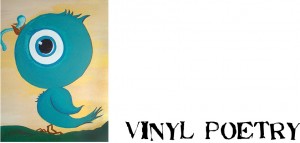 Editors Gregory Sherl (poet and author of The Oregon Trail Is the Oregon Trail, a novella in verse forthcoming from Mud Luscious Press in 2012) and KMA Sullivan (MFA candidate in poetry at Virginia Tech) are the energy behind newly launched Vinyl Poetry online.
Editors Gregory Sherl (poet and author of The Oregon Trail Is the Oregon Trail, a novella in verse forthcoming from Mud Luscious Press in 2012) and KMA Sullivan (MFA candidate in poetry at Virginia Tech) are the energy behind newly launched Vinyl Poetry online.
The inaugural issue of Vinyl features works by JoAnn Balingit, Kristy Bowen, Melissa Broder, Andrea Cohen, Sasha Fletcher, Matt Hart, Thomas Patrick Levy, Rob MacDonald, Adrian Matejka, Ben Mirov, Sam Pink, Anne Marie Rooney, Nate Slawson, Joseph Young, and Franz Wright.
An additional feature titled Grocery Lists is the result of asking three writers for a handwritten grocery list. What Vinyl got: “One [Julianna Baggott] offers a personal essay. One [Jeff Mann] puts together an end-of-life fantasy to do list. One [Bob Hicok] sends in a handwritten list with some items that are hard to locate – like a better serve for his tennis game.”
Vinyl currently publishes works by solicitation only. According to the editors: “We’re constantly trolling the online mags for poets we’re excited about. We’re interested in fostering the already thriving online community of poets and writers. But since we are writers ourselves, we just don’t have time to go through a mass of submissions.”
Still, if you are a published poet, they encourage you to send an email with links to your poetry online. They’ll take a look, and if your work makes them “tingle,” they’ll ask you for some new stuff.
Spread the word!
Glimmer Train June Fiction Open Winners :: 2010
Glimmer Train has just chosen the winning stories for their June Fiction Open competition. This competition is held quarterly and is open to all writers for stories with a word count range between 2000 – 20,000. The next Fiction Open will take place in September. Glimmer Train’s monthly submission calendar may be viewed here.
First place:  Nona Caspers, of San Francisco, CA, wins $2000 for “Ants.” Her story will be published in the Fall 2011 issue of Glimmer Train Stories. [Photo credit: Arlene Diehl]
Nona Caspers, of San Francisco, CA, wins $2000 for “Ants.” Her story will be published in the Fall 2011 issue of Glimmer Train Stories. [Photo credit: Arlene Diehl]
Second place: James F. Sidel, also of San Francisco, CA, wins $1000 for “Insurance.” His story will also be published in an upcoming issue of Glimmer Train Stories.
Third place: S. Ruth Joffre, of Falls Church, VA, wins $600 for “Grateful, Somewhere.”
A PDF of the Top 25 winners can be found here.
Deadline soon approaching for the Short Story Award for New Writers: August 31
This competition is held quarterly and is open to all writers whose fiction has not appeared in a print publication with a circulation over 5000. No theme restrictions. Word count should not exceed 12,000. (All shorter lengths welcome.) Click here for complete guidelines.
Spread the word!
CFS Southern Poetry Anthology – Louisiana
Editors Paul Ruffin and William Wright now seek submissions for the fourth volume in their series of THE SOUTHERN POETRY ANTHOLOGY, featuring Louisiana poets. The anthology will be published by Texas Review Press in 2011. CFS for a Georgia anthology is forthcoming.
If you are a Louisiana native, or if you have lived in Louisiana for more than one year at any time, please feel free to send up to five poems for consideration. This anthology is not limited to those who have published before; the editors invite first-time submitters as well as those who have had full-length poetry books published by national presses. The only rules: Poems must be original and of high quality.
The editors consider formal poems and free verse. Poems about Louisiana are not necessarily championed over other motifs and themes, as they wish for the “sense of place” to manifest in different ways, with different voices.
Please note that the success of this anthology depends a great deal on word of mouth. Notify your poetry students, poetry-writing friends, and gifted nemeses of this opportunity.
SUBMISSION REQUIREMENTS
Please submit your poems to the Series Editor and Volume Editor, William Wright, at vercimber-at-hotmail-dot-com. Please type “Louisiana Poetry Submission” in your subject heading, then include your first and last names in parentheses. For example: Louisiana Poetry Submission (William Wright). Unfortunately, snail-mail submissions are not possible given the nature of the editing process.
Please include a short cover letter within the text of the e-mail, as well as names of the poems submitted. Submit a maximum of five poems, and ensure that the poems are sent in .rtf (Rich Text Format), .doc (World 97-03), or .docx (Word 2007) format. Please include all submitted poems in only one attachment (this is important).
All submissions should include a bio (up to 150 words) after the poems and on a separate page. Please italicize names of publications.
The editors welcome both new and previously published work. However, if poems have been previously published, submitters must hold rights to them and provide full publication data (journal and/or book publisher, title of book/journal if applicable, date of publication). Finally, please make sure that each submission includes a preferred e-mail address and street mailing address within the text of the e-mail and on at least one page of the attached submission.
Submission Deadline: September 30 (Early submissions encouraged!)
[Via William Wright and Paul Ruffin, Editors]
Spread the word!
Gargoyle – 2010
Gargoyle came into being in 1976. It was started to put light on “unknown poets and writers, and the overlooked.” It bravely began as a monthly, with not much more than a handful of poems, short stories and nonfiction and “graphics”; but it began with quality. For example, its first issue boasted a poem from the then-unknown budding young poet named Jim Daniels. It slowly grew larger over time until it became the huge beast of a literary magazine it is today. It has continued to have quality poets and writers. Continue reading “Gargoyle – 2010”
Spread the word!
Green Mountains Review – Spring/Summer 2010
This issue opens with terrific translations of the work of Syrian poet Adonis (Ali Ahmad Said Esber) from Khaled Mattawa, from the book Al-Mutabaqat wal-al-Awa’il (Similarities and Beginnings), published in 1980. These poems are, according to an introductory essay by Mattawa, a departure from the poet’s earlier interest in longer forms, and they demonstrate his skill with the short lyric. They are tightly, and expertly, constructed, with lush imagery, despite their taut shape. Here is “The Beginning of Death” in its entirety: Continue reading “Green Mountains Review – Spring/Summer 2010”
Spread the word!
Kitty Snacks – 2010
In this issue of Kitty Snacks, the introduction belongs to Deb Olin Unferth. Her “Limited Observations” is not so much a story in its traditional form, but an amusing list of things the ubiquitous ‘she’ has observed. This style lends itself well to the itemized life that ‘she’ lives. For example, two delightful items in this list are “Committees” and “Deletion.” For the first, Unferth writes, Continue reading “Kitty Snacks – 2010”
Spread the word!
The Pacific Review – Spring 2010
You, the reader, may notice that this review seems to be split in half. How odd, you may think. Actually, I’ve combined the two because they are combined within the same two covers. You can tell, though, when the magazine switches from The Pacific Review to Ghost Town, as the pages abruptly turn upside down at the intersection. Now, to the first… Continue reading “The Pacific Review – Spring 2010”
Spread the word!
Prairie Schooner – Summer 2010
I am interested in almost any writing about work (as in the exchange of time spent in goal-oriented activity for wages) and also in the work of crafting long poems, so I was drawn immediately to “After Work,” a poem in 20 brief sections by Martha Collins: Continue reading “Prairie Schooner – Summer 2010”
Spread the word!
Southern Humanities Review – Spring 2010
My recent reading just happens to have included a great deal of poetry by women whose work in the first half of the last century is now largely forgotten or ignored, so I was surprised, pleased, and curious to discover Mina Loy’s name in a poem by Priscilla Atkins in this issue’s TOC. I had to start there, though I was tempted to begin with a poem by Michael Andrews, “Lykambes Has Promised Neobulé,” because it has the most unusual title in the issue; or Terry W. Thompson’s “Spencer Rex: The Oedipus Myth in Henry James’s ‘The Jolly Corner,’” because I am fond of academic essays, and as editor Chantel Acevedo notes in her Comment, few journals publish them. Continue reading “Southern Humanities Review – Spring 2010”
Spread the word!
Spoon River Poetry Review – Winter/Spring 2010
This 35th anniversary issue is editor Bruce Guernsey’s last after four years. He will be succeeded by Kristin Hotelling Zona, associate professor of English at Illinois State, where the journal is published. This issue’s Illinois Poet (an interview and a dozen poems) introduces the work of Cathy Bobb; the Poets on Teaching column presents Wesley McNair’s exercises for introducing students to free verse; translations include work from Brazil, Spain; and poems by 20 poets. Continue reading “Spoon River Poetry Review – Winter/Spring 2010”
Spread the word!
Thin Air Magazine – 2010
This issue of Thin Air opens with a hilarious poem about fire, which, by rights, shouldn’t be funny at all. But Matthew J Spireng’s poem “In Case of Fire” will have you smiling by its end. Spireng writes, Continue reading “Thin Air Magazine – 2010”
Spread the word!
The Yale Review – July 2010
A very Yale-Review-like issue of the Yale Review, which is to say that this is a journal for the serious-minded reader who appreciates scholarly essays of thoughtful analysis alongside her poetry, fiction, and personal essays. And if you’re looking for writers with an established track record and name recognition, Yale Review is always a good choice (Louis Auchincloss on Henry James; Arthur Kirsch on Auden; poems by Charles Wright, Carl Phillips, Daryl Hine, David Wagoner, Cynthia Zarin; fiction by Alice Hoffman…Alice Hoffman! [that was actually something of a surprise]), this is the journal for you. Continue reading “The Yale Review – July 2010”
Spread the word!
Antioch Review :: Fiction Will Survive
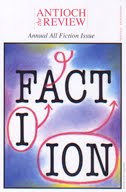 “Many writers and editors hope that literary magazines will carry writers through these difficult economic times by providing outlets. There is the usual hysteria about the ‘death of fiction’ but we have seen little of that here as young, middle-aged and older writers keep emerging, keep sharpening their pencils and trying to ouwit and outfence their readers. It’s not like the heyday of the late sixties when George Hitchcock published Kayak, when Gordon Lish shepherded and drove Raymond Carver to reach beyond himself and the bottle to produce a new order of writing that was distinctive, driven by aesthetic concerns rather than merely commercial ones.
“Many writers and editors hope that literary magazines will carry writers through these difficult economic times by providing outlets. There is the usual hysteria about the ‘death of fiction’ but we have seen little of that here as young, middle-aged and older writers keep emerging, keep sharpening their pencils and trying to ouwit and outfence their readers. It’s not like the heyday of the late sixties when George Hitchcock published Kayak, when Gordon Lish shepherded and drove Raymond Carver to reach beyond himself and the bottle to produce a new order of writing that was distinctive, driven by aesthetic concerns rather than merely commercial ones.
“It certainly was an imperfect golden age, but short stories (very good ones) are still being produced and there are, as Salman Rushdie noted, lots of terrific magazines that continue to nourish the hears of readers and writers.”
Excerpt from Robert S. Fogarty’s Editorial “The Short Story Today” from The Antioch Review’s Annual All Fiction Issue
Spread the word!
Calyx Celebrates 34 Years
 After a year of seeing so many long-standing publications shut down, it sure is good to recognize the 34th anniversary of Calyx, and especially considering the work that Calyx has done over the these year to “provide a forum for women’s creative work — including work by women of color, lesbian and bisexual women, young women, old women.” Happy Anniversary Calyx!
After a year of seeing so many long-standing publications shut down, it sure is good to recognize the 34th anniversary of Calyx, and especially considering the work that Calyx has done over the these year to “provide a forum for women’s creative work — including work by women of color, lesbian and bisexual women, young women, old women.” Happy Anniversary Calyx!
Spread the word!
VQR Writers from Iran
The Summer 2010 issue of Virginia Quarterly Review includes A Special Symposium of Writers from Iran in response to recent events, including the death of Neda Agha-Soltan, who’s death during protests in central Tehran was captured on video and quickly went viral. VQR recounts the events that lead up to this tragedy, and introduces readers to the personal life of Neda, including her love for photographer Caspian Makan, who was jailed following Neda’s death and has since been released and fled his home country.
“To tell this side of life in Iran—the personal side, the side of longing and heartbreak—we asked Iranian-born writers Laleh Khadivi and Erika Abrahamian to assemble a special portfolio of work by writers from Iran. They have gathered intimate portraits of love curbed by Sharia law and separation imposed by political imprisonment; this work illustrates both the untenable strictures that give rise to protest and the unendurable consequences of opposing the government’s mandates. They also provide the backdrop and context for the other places in the world where people find themselves caught between impossible choices.”
Read more on VQR, including some articles in their entirety.
Spread the word!
Writers Not on Writing
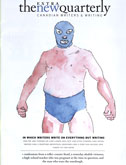 The New Quarterly #115 includes The Extra New Quarterly 40+ page supplement trade-format magazine “In Which Writers Writing on Everything But Writing.” Guest edited and introduced by Katia Grubisic, it includes watercolors by Jon Claytor and the following sections and authors:
The New Quarterly #115 includes The Extra New Quarterly 40+ page supplement trade-format magazine “In Which Writers Writing on Everything But Writing.” Guest edited and introduced by Katia Grubisic, it includes watercolors by Jon Claytor and the following sections and authors:
CONFESSIONS
AMY JONES Confessions of a Roller Coaster Addict
ANNE FLEMING Confessions of a Ukulele Devotee
PATRICIA YOUNG Confessions from the End of the World
RICHARD CUMYN Confessions of a Sourdough Nerd
CARRIE SNYDER Confessions of an Unsettled Woman
HEATHER BIRRELL Confessions of a High School (Student) Survivor
COLLECTIONS
TERRY GRIGGS Rockface
JEANETTE LYNES Enlightening Fetish
SKY GILBERT Bank Ladies
OBSESSIONS
PASHA MALLA A Night at the Theatre
KATHRYN KUITENBROUWER Wide Open
MICHAEL REDHILL The Root of Consciousness
LEESA DEAN Cycle
REFLECTIONS
ALBERTO MANGUEL Stubborn Continuity
ANNE SIMPSON The Great Saskatoon Scavenger Hunt
ISABEL HUGGAN Reflecting on Mirrors
GORAN SIMIC Anatomy of Escape
RONNA BLOOM To Be With Strangers
ANDREW TIBBETTS The Taste of Pins
Spread the word!
Shenandoah Update
A letter sent out by Editor R.T. Smith to Shenandoah subscribers:
I am writing to inform you that Shenandoah is approaching a crossroads which to some degree reflects the broader evolution in the world of publishing. You may have already read on our website that the magazine will cease publishing as a print journal and will expand its presence on-line. By the end of 2011 our website will be the sole location of the journal, where it will be available to all on a non-fee basis, though we hope to incorporate additional features available only to those with unexpired subscriptions. All physical issues going back 15 years and continuing into this winter will still be available for purchase.
Though this evolution will involve significant changes in format, the features which I believe to be Shenandoah’s essence will remain: artful and memorable poems, stories, essays and reviews from all comers of the literary community; a pleasing and stimulating design, provocative inquiry into the on-going chorus that is contemporary writing and our signature brand of serious mischief. As editor, I will continue to seek accomplished and fresh work to maintain our balance between the traditional and the experimental. We’ve already altered our web page to offer a hint of the future, and in 2011 we’ll feature a blog called “Snopes.”
Our fall/winter issue will be a standard perfect-bound magazine, and in the spring of 2011 we will release a limited edition anthology of Shenandoah poetry from 1995 to 2010. This anthology will be sent to all whose subscriptions extend to spring of 2011, and additional copies will be available. I hope that subsequent anthologies will eventually become feasible.
While many of us harbor divided minds about the dwindling of the physical print medium, I’m enthusiastic about the possibilities -from audio presentations to ease of access and extended audience and more frequent updates -presented by this brave new world of the Internet. The increased involvement of Washington and Lee students will be an asset in this changing environment, and we intend to launch our new identity with a fall 2010 on-campus panel of editors discussing the changing landscape of literary publishing. Our first digital issue will publish the proceedings of that conversation.
There is further good news. Shenandoah will continue to give honoraria and awards to its writers, and national prize anthologies have now begun to recognize the work in on-line journals. Publication on-line now counts as a legitimate credential towards qualifying for N.E.A. fellowships, so the territory we are entering is not hostile to serious literature. I believe it is becoming quite hospitable and that accomplished writers have already begun to recognize this. I thank you for your loyalty in the past, invite you to join us in this new adventure built on our sixty-year history and urge you to visit our Face book page beginning in October as we prepare to move into a new era.
Spread the word!
Call for Fellowship Applications
Movement, Somatics and Writing: A Practice-Based Research Symposium February 18th/19th, Duderstadt Video Performance Studio, University of Michigan, Ann Arbor
Conference Team:
Amy Sara Carroll, Assistant Professor of English and American Culture (Latina/o Studies), UM Thom Donovan, poet and essayist, co-editor of ON: Contemporary Practice and the weblog Wild Horses Of Fire Kate Elswit, Andrew W. Mellon Fellow (Drama/Dance), Stanford University Bhanu Kapil, Assistant Professor, Jack Kerouac School of Disembodied Poetics, Naropa University (Cross-Genre Narrative and Poetics) Jina Kim, PhD student, English/Women?s Studies, UM (Visual Culture) Petra Kuppers, Associate Professor of English, UM (Performance Studies) Eleni Stecopoulos, poet, writer, educator, curator of the Poetics of Healing project at the Poetry Center, San Francisco State University
In our forth arts-based inquiry symposium (after Anarcha: African American culture/Disability Culture/Medical Ethics; Touching Time:
Bodies/Writing/Histories; Eco-Performance) we want to build on the
inter- or transdisciplinary methods explored so far, and invite scholars and artists to engage in experimental writing and art practice at the sites/cites of the moving, living body and the moving, living text.
We invite up to ten fellows (graduate students, faculty, independent artists and writers) to come together for two days, to workshop, to use performances and presentations as provocations, and to plumb methods of merging art practice and critical writing. The specific topics we will address are yet to be determined by applicants’ interests. But, to date, this symposium’s foci include or relate to innovative methodologies, writing-as-practice, somatics/embodiment, breath poetics, prosodic magic, language limit zones, conceptual -isms, skin and membranes, mixed media and metaphors, the ethics of touch and movement, enjambed spacetime, transitions and becoming ______ . We will be in praxis together: this is not a conference to share the results of previous research or practice. Thus, we are not looking for papers, performances, portfolios, or readings; we plan to experiment. Come and share the excitement of your creative and critical research, present a workshop based on your passions, and find out what could happen.
Each invitee will have transport and accommodation costs reimbursed up to $200 dollars. The conference hotel offers rooms for about sixty dollars a night, and we will assist people who want to be hosted by graduate students.
Application Process: please send a short CV, a sample of your writing (creative, experimental, performative or critical), and a brief statement about why you would like to participate, to petra-at-umich.edu.
You can also send URLs or a DVD or CD with performance or visual arts material.
Query first about snail mail address by emailing the symposium director: Petra Kuppers, petra-at-umich.edu.
Deadline: October 1, 2010 Notification: October 20, 2010
—
Petra Kuppers
Associate Professor
English, Theatre and Dance, Women’s Studies University of Michigan
435 S. State Street
3187 Angell Hall
Ann Arbor
MI 48109-1003
mobile: 734-239-2634
email: petra-at-umich.edu
Artistic Director of The Olimpias
homepage: www.olimpias.org
Spread the word!
TriQuarterly Online
TriQuarterly’s first online issue is now available.
Spread the word!
ClassicsTurned Poster Art
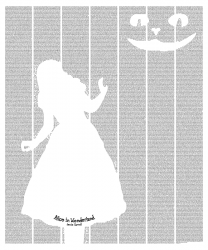 Based in Ontario, PosterText offers classic text turned poster art. Novels like Peter Pan, Moby Dick, Wizard of Oz, and Alice in Wonderland are fashioned onto readable, poster-sized paper. In some cases, the full text is used, while in others, only a portion (the first 26 chapters of Moby Dick). There’s also a poster of the US Constitution and the source code of the Linux Kernel with more novels planned.
Based in Ontario, PosterText offers classic text turned poster art. Novels like Peter Pan, Moby Dick, Wizard of Oz, and Alice in Wonderland are fashioned onto readable, poster-sized paper. In some cases, the full text is used, while in others, only a portion (the first 26 chapters of Moby Dick). There’s also a poster of the US Constitution and the source code of the Linux Kernel with more novels planned.
Spread the word!
Daring Publishing
“One might argue that it’s easy enough to criticize from outside the world of profit margins. But I think that even in this climate – maybe especially in the climate – publishers would benefit from a more daring and honest mode of decision making, one in which the virtues of the thing itself were allowed to outweigh hypothetical projections of its marketability. What if the primary question were not Will it sell? but Is it good? . . . I realize, of course, that ‘good’ is not some kind of simple universal category . . . We need diversity of informed, sophisticated opinion in publishing, just as we need it in every sphere of life. What we don’t need is a relentless march toward the middle, a huddling together in the safest spot. We don’t need publishing decisions driven by some algorithmic notion of what the greatest number of people might be most likely to buy.” Christina Thompson, Harvard Review #38
Spread the word!
New Lit on the Block :: Pig in a Poke
Editors Harry Calhoun, the publisher of the ’80s underground magazine Pig in a Poke, and Trina Allen, have resurrected Pig in a Poke, “The New Porker,” now available online.
In it’s former life (dare I say hay-day?) “The Pig” featured work by Charles Bukowski, Jim Daniels, Louis McKee, Lyn Lifshin, Judson Crews and many more. And now hopes to find “writers with passion — poets, storytellers, essayists and others.” Calhoun will oversee the poems and literary essays, while Allen will select the fiction.
The re-inagural issue features Poetry by Jim Daniels, Louis McKee, Lyn Lifshin, Howie Good, Christopher Cunningham, William Doreski, David Barker, Carol Lynn Grellas, Robin Stratton, Alan Catlin, Karla Huston, Corey Mesler, Donal Mahoney, Shirley Allard; Fiction by Sharmagne Leland-St. John, Daniel Davis, Anne Woodman, Burgess Needle, Marjorie Petesch, Ginny Swart, James Neenan; and Essays by Anne Woodman and Heller Levenson.
A second issue went live in July, and Pig and a Poke is accepting submissions for an October issue, deadline September 15. Submissions are open year-round for upcoming issues.
Spread the word!
Journal of Graphic Novels and Comics
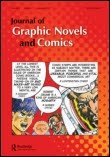
New from Routledge is the biannual Journal of Graphic Novels and Comics – “covering all apspects of the graphic novel, comic strip and comic book, with an emphasis on comics in their cultural, institutional and creative contexts.” The first issue is available free online.
Spread the word!
Dacha Life
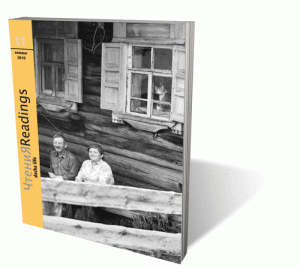 The latest issue of Chtenia Journalis themed “Dacha Life” – second home, rural living for city dwellers (something southern Michigan city dwellers refer to as “going up north” or “to the cabin” – usually near water). Editor Tamara Eidelman writes in her introduction, “Autonomy, Solitude and Peace”:
The latest issue of Chtenia Journalis themed “Dacha Life” – second home, rural living for city dwellers (something southern Michigan city dwellers refer to as “going up north” or “to the cabin” – usually near water). Editor Tamara Eidelman writes in her introduction, “Autonomy, Solitude and Peace”:
“Of supreme importance at the dacha is that life there be absolutely unlike life in the city. For a landowner in the second half of the nineteenth century, it meant there was no need to follow the conventions of high society. For a city person, it meant resting from the burdens of one’s labors, breathing fresh air free of the smoke and soot of a large city, and socializing with friends without any excessive formality . . . For over a century, Russian city dwellers have bee attracted to dacha life for the autonomy, solitude and peace it has to offer. So it is no accident that so many works of Russian literature take place in dachas – this is where people feel freer, where they open up more quickly.”
And this issue of Chtenia continues this tradition with contemporary authors prose and poetry in English (Alexei Bayer, Irina Borisova, Marina Arsenievna Tarkovskaya) as well as translations of past Russian writers: Leonid Nikolayevich Andreyev, Alexander Blok, Aton Chekhov, Bavrila Romanovich Derzhavin, Fyodor Dostoyevsky, and Vladimir Mayakovsky.
Spread the word!
Cultural Pride and Shame
Now in its second issue, Elder Mountain: A Journal of Ozarks Studies editor C. D. Albin addresses the fine line, or “enduring tension between shame and pride” that is part of the “cultural complexity” of the Ozark region: ” –shame at a supposed backwardness or lack of sophistication, pride in foregoing conformity and in maintaining connections to the wisdom and folkways of past generations. The upshot is that Ozarkers, who tend to be reticent about their feelings, rarely discuss shame or pride. After all, pride itself tends to make shame a dirty word, and pride fuels resentment at a larger culture Ozarkers perceive as turning shallow notions of ‘hillbillies’ into a default joke, always good for a programmed laugh when genuine cleverness roves too taxing. Yet complaining about such portrayal can hint that one might feel ashamed or bothered by them, so little is said at all.” Except between the pages of Elder Mountain, where writers express and explore this very tension and complexity.
